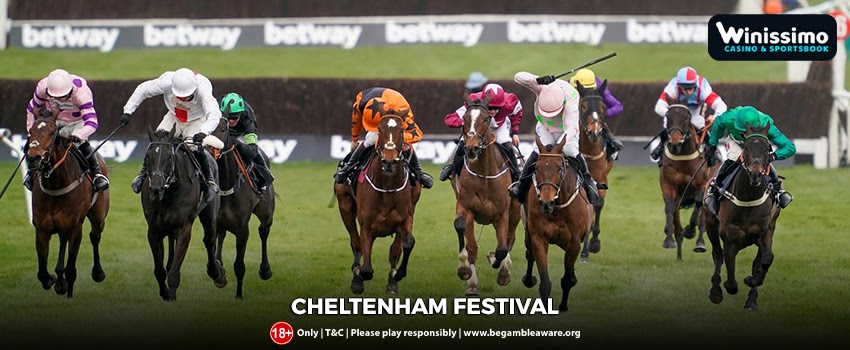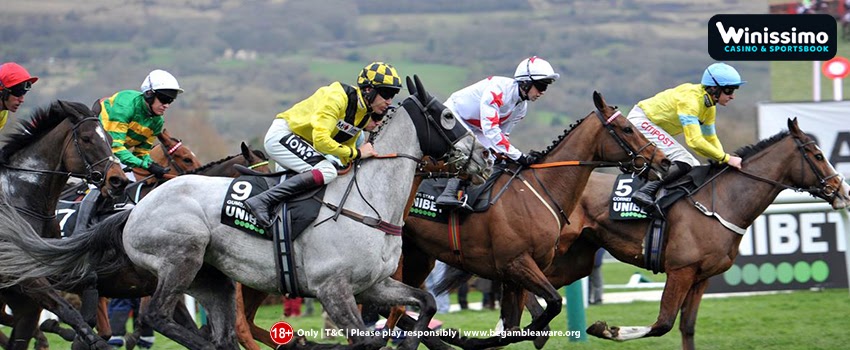The Cheltenham Festival is one of the most prestigious horse racing events globally, with four days of top-notch National Hunt racing involving so many of the world’s best jockeys, trainers and horses.
The festival, which takes place every year in England, is a must-see event on the British racing calendar. It attracts large crowds both on the ground and on tv. And during the festival, racing fans from all over the world flock to Cheltenham Racecourse, although it is most popular with Britain and Ireland. The festival is held in March for nearly a week, from Tuesday to Friday, and normally coincides with St. Patrick’s Day. It is regarded not only for the high-quality racing but also for the incredible atmosphere it creates. The fans are normally very loud as they cheer on their favourite horses, and the noise they make as the opening race of the festival begins is known as the “Cheltenham Roar.”

Obviously, a horse racing event of this magnitude draws a large number of bettors to the Cheltenham Festival. Naturally, bookies are extremely active during festival week, and bookmakers and internet betting companies take in millions upon millions of dollars in bets.
We have got more betting facts on the Cheltenham Festival, as well as a history of the race and other important details.
The Cheltenham Festival: A Quick Overview
In 1815, the very first horse racing event in Cheltenham was held in Nottingham Hill. In 1819, the inaugural Cheltenham Gold Cup was run. However, it was only a 3-mile flat race without any obstacles. It is the most popular race in the festival to this day, and it is always held on the last day of the event. The races were hardly complicated back then. The competition was a flat race rather than the usual huddles and barriers for horse jumps.
The present gold cup tournament was first staged in 1924, with a £685 prize pool. The festival is now set for March, and it corresponds with the observance of St. Patrick’s Day, which may explain why it draws over 200 000 participants. The gold cup is by far the most renowned non-handicap race in the United Kingdom, covering around three miles and featuring 22 fences.
Cheltenham Festival in the 21st Century
The festival has gained popularity over the generations and is now considered one of the most important sporting events in the UK. In 2005, it was spread to four days, with 6 races each day. Since then, more races have also been added to the schedule, bringing the total number of races to 27 since 2014.
Even though horses from all around the world attend the Cheltenham Festival, the majority of the horses are trained in the United Kingdom and Ireland. It is regarded as a major highlight of National Hunt Racing, with attendance consistently exceeding 200,000 for the entire week. The reward money offered is second only to that presented at Aintree’s Grand National meeting in April.

Races for the Championship
One of four championship races is held every day of the Cheltenham Festival. These 4 races are the most crucial of the week, with the Cheltenham Gold Cup on Friday being the most valuable of them all. The following are some of the most significant specifics about every other of the championship horse races.
-
World Hurdle Course
The World Hurdle, formerly known as the Stayers’ Hurdle, superseded the Spa Hurdle in 1972. When Ladbrokes acquired sponsorship in 2005, the name was altered to its current appellation. The race is accessible to children aged four and up and takes place over three miles with 12 hurdles to clear. It takes place on the festival’s third day.
-
Queen Mother Champion Chase
This Queen Mother Champion Chase has been held on the ancient course at Cheltenham since 1959. It is a 2-mile race with 12 fences. The National Hunt racing calendar’s major lowest possible race is eligible to horses belonging to the age group five and up. It usually occurs on the festival’s 2nd day.
-
Hurdle Champion
This race was first held in 1927, and it now occurs on the festival’s first day. It is eligible for horses over the ages of 4 and takes place over a distance of 2 miles and a half furlong (which is 3,319 meters). There are eight hurdles to cross in this hurdle race.
-
Gold Cup at Cheltenham
The Cheltenham Gold Cup takes place on the festival’s last day and is regarded as the most significant race of the week. It began in 1924, and horses had to be at most five years old to compete. The event has 22 obstacles and is conducted over a distance of 3 miles and 2 and a half furlongs.
Leading trainers & top jockeys
During the Cheltenham Festival, the rider who rides the most victories is crowned the top jockey. The leading trainer is the one who has trained the most winners.
Placing a bet on the Cheltenham Festival
Betting is an important aspect of almost each horse racing event. This is particularly true at the Cheltenham Festival, which draws significant betting interest. Over the four days, scores of millions of pounds are wagered on the races, both on and off the track, and there is also a substantial ante-post market. The festival’s awarding of prizes is famously tough. The majority of the races are quite competitive, especially the championship events, and multiple horses are frequently in contention. There’s also the fact that the race is quite difficult, with many falls. These characteristics together make it difficult for even the most experienced bettors to consistently win at this event. Placing bets on the festival, on the other hand, is a lot of fun, and you can choose a few winners during the 4 days. We don’t have a specific technique that we advocate, though it does help if you are knowledgeable with the necessary form. It is also good to look at how specific horses, riders, and trainers perform in the festival.
During the Cheltenham Festival, one form of betting recommendation that you should absolutely contemplate following is to try to take advantage of all the special offers offered at online bookmakers. Winissimo is one such platform that provides many options for sports betting.
The online betting business is quite competitive. This is especially true during major events when most betting companies will run various specials to entice you to place a wager. You may get a lot of added value online during festival weeks, such as improved rates and free bets, and you should take advantage of it as much as possible.
